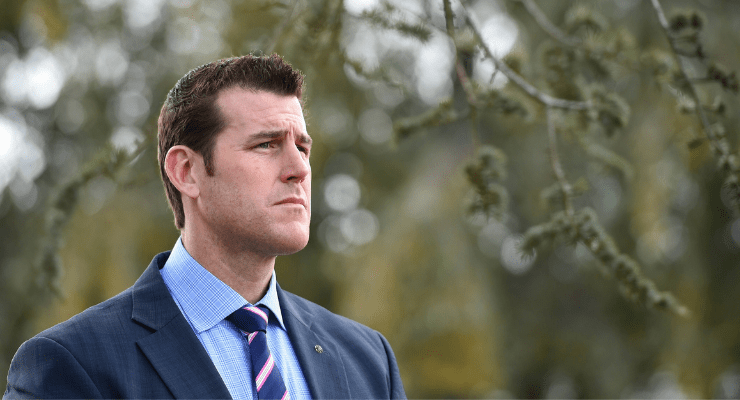
Whatever the outcome of the Ben Roberts-Smith case, no one wins. His reputation is in shreds. The lives of his accusers have been turned upside down. And the army that was his home is divided over the evidence spilling out from a courtroom each day.
Roberts-Smith holds the highest award in the nation’s honours system. That 2011 Victoria Cross puts him in an elite squad, and adds to a Medal of Gallantry he picked up in 2006 and a distinguished service leadership commendation he received in 2012.
After he left the army in his mid-30s, it seemed his career was unassailable. He became the darling of the boardroom set — at least in Queensland — giving speeches to company directors that traversed everything from strategy to good governance. He was courted by universities and business, and ended up running broadcaster Seven Queensland.
He chaired the National Australia Day Council, and as a highly paid keynote speaker he had grown men and women sobbing into their handkerchiefs over the role played by our defence forces on the battlefield.
And now, as the Morrison government embarks on a herculean $38 billion, 16-year military recruitment drive, Roberts-Smith — the former uber poster boy for defence — fronts up to court each day to hear another murderous accusation levelled against him.
That’s the correct place for that evidence to be heard and judged. But what’s the impact of this flow of daily courtroom information? And how do we genuinely, in 2022, see the role of our armed forces?
When the heavens opened and the rain didn’t let up a couple of weeks ago, people pleaded for the army for help — and hit out at a response they believed was tardy. In fairness, that blame should not be directed to the ADF; rather it was the state and federal governments playing a blame game over responsibility for deploying resources.
But is it the role of our soldiers to leave training camps and day jobs to sweep mud from homes down the east coast of Australia? I say yes, it is. But many will disagree — making the point that other service personnel, like police, aren’t required to jump on planes at a moment’s notice and take to the battlefield.
It’s a debate we need to have as a nation, as the mud stains stay plastered to the sides of homes and offices, schools and company buildings across northern NSW and southern Queensland.
Next time a natural disaster hits — and there will be one — what is the protocol we support? Who makes that call? How will soldiers be dispersed? And what jobs should they be required to undertake? Common sense would dictate that, like the volunteer armies that pop up like mushrooms during natural disaster heartaches, it should not need to be proscribed.
The recent deathly floods showed that it does. It needs to be made clear whether helping the nation’s people, inside or outside the country, is part of the job description when signing up for one of those 20,000-odd uniformed personnel roles that will be part of the Morrison government’s recruitment drive.
The furore around Roberts-Smith will colour that drive, which is vital to help bed down a military strategy that will stretch to 2040. But back in the courtroom, nothing is acting as a lure to encourage young people to don an ADF uniform and help swell the ranks of our armed forces.
Indeed the claims pouring out each day can only hurt the reputation of our armed forces, made up of stellar individuals who put the nation before themselves.
Such are the gruesome accusations that it’s likely to also be tarnishing the reputation of our ADF outside Australia. And it will definitely act as a turn-off to all those potential young Australians who might shine, dressed proudly in a uniform showing they belong to our defence services.
At every level in this case, all the stakeholders lose.








Crikey encourages robust conversations on our website. However, we’re a small team, so sometimes we have to reluctantly turn comments off due to legal risk. Thanks for your understanding and in the meantime, have a read of our moderation guidelines.